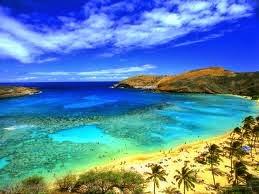
Hawai’i is one of the most popular tourist locations because it offers so much to the visiting traveler. From volcanoes to scuba diving to surfing to historical WW II attractions to a rich cultural island history that predates the advent of foreigners.
I had the opportunity to visit my son and daughter-in-law on the Hawaiian island of Maui recently and was taken back by how much it has developed since the days, several decades back, when I got my scuba diving instructor certification there. Yes, some of the growth was a bit disturbing to see - I’m not much of a "tourist" and to see the environment encroached upon by one resort after another did not sit well. However, I was pleased to see how underwater sports has developed there, making it easier for more people to experience and appreciate the underwater environment (and hopefully inspire visitors to ensure that it does not become over-exploited).
Snorkeling is very big in Maui - there seems to be a snorkel gear rental shop on every corner. And for certified scuba divers, there are shore dives or boats to take you to outer islands like Lana’i and Molokini. But there’s also a "middle ground" of dive sites - clear coral reefs far enough offshore to be a challenge for scuba divers to reach, particularly the occasional dive vacationer who only puts in 2 or 3 dives a year. That’s the niche that Scuba Luv Maui tries to fill and does it in a wonderfully relaxed fashion using underwater dive scooters.
Maui’s reefs, right offshore, are great for snorkelers but they suffer from the shallow water and wave action that keeps the sand and silt churned up. Fine perhaps for the snorkelers, but scuba divers want reefs with color and plenty of sealife. To do that, you need to get much further out where there are reef walls and drop-offs that provide you with the pastel-hued hard coral reefs and the variety of sealife Hawai’i is known for. Scuba Luv Maui owners Steve and Diana Madaras accomplish this using underwater dive scooters. These scooters can be held with your arms but that can ultimately become tiring as you are being "pulled" through the water But by positioning it between the legs, the scooter provides a "push" - controlled propulsion that requires very little effort on the part of the diver.
I’ve known and dived often with Steve and Diana when they were based in Southern California at Catalina Island. Having moved their operation to Maui in 2002, I missed their good humor and love of diving, so I made a point of contacting them and seeing what would be of interest on a couple of quick dives I could slip in with my son. "Well, you ought to try one of our Hawaiian Superman scooter dives," Steve says. Okay, I’ll bite.
At the south end of Maui, in Kehei, we launched from shore to visit a WW II Helldiver aircraft wreck. The plane apparently experienced engine trouble during training and splashed down about a half mile offshore, settling in a sandy area at about 50 feet. It was a great dive, exploring the plane, made all the more fun with the help of the scooters to get us there.
On another dive, we traveled further out to an area where the state had considered establishing an artificial reef area using auto tires set in concrete slabs. Plenty of hiding places for fish, but hard coral grows tremendously slow on a rubber substrate. At least these tires didn’t suffer the same disastrous fate as occurred in Ft. Lauderdale, Florida in the 70s, where stacks of tires were strewn across the sea bottom due to typhoon wave action.
The key feature of this dive was just beyond the "reef" at 60 feet. The Saint Anthony fishing trawler was sunk there, having been confiscated in a government drug raid. In classic shipwreck fashion, there was hard coral growth, lots of fish, and Hawaiian green sea turtles resting on the decks, getting cleaned of algae by a variety of fish.
It was great to see the increasing numbers of sea turtles in Maui today. When I was diving there before, the turtle population was quite low and dive shop Divemasters would try to keep dive tourists away from any turtles they came upon, thereby putting out the welcome mat with the hope of seeing their numbers increase. With that, combined with government protections put in place and enforced, the number of turtles has certainly rebounded.
When I give lectures or presentations, I call upon many of my past diving experiences to help listeners appreciate the beauty and and diversity of our natural underwater resources. Active, hard core dive travelers get those experiences, but sometimes the infrequent diver does not. Scuba Luv Maui has a great solution, whether a beginner or pro diver.
Source: Scuba Luv Maui